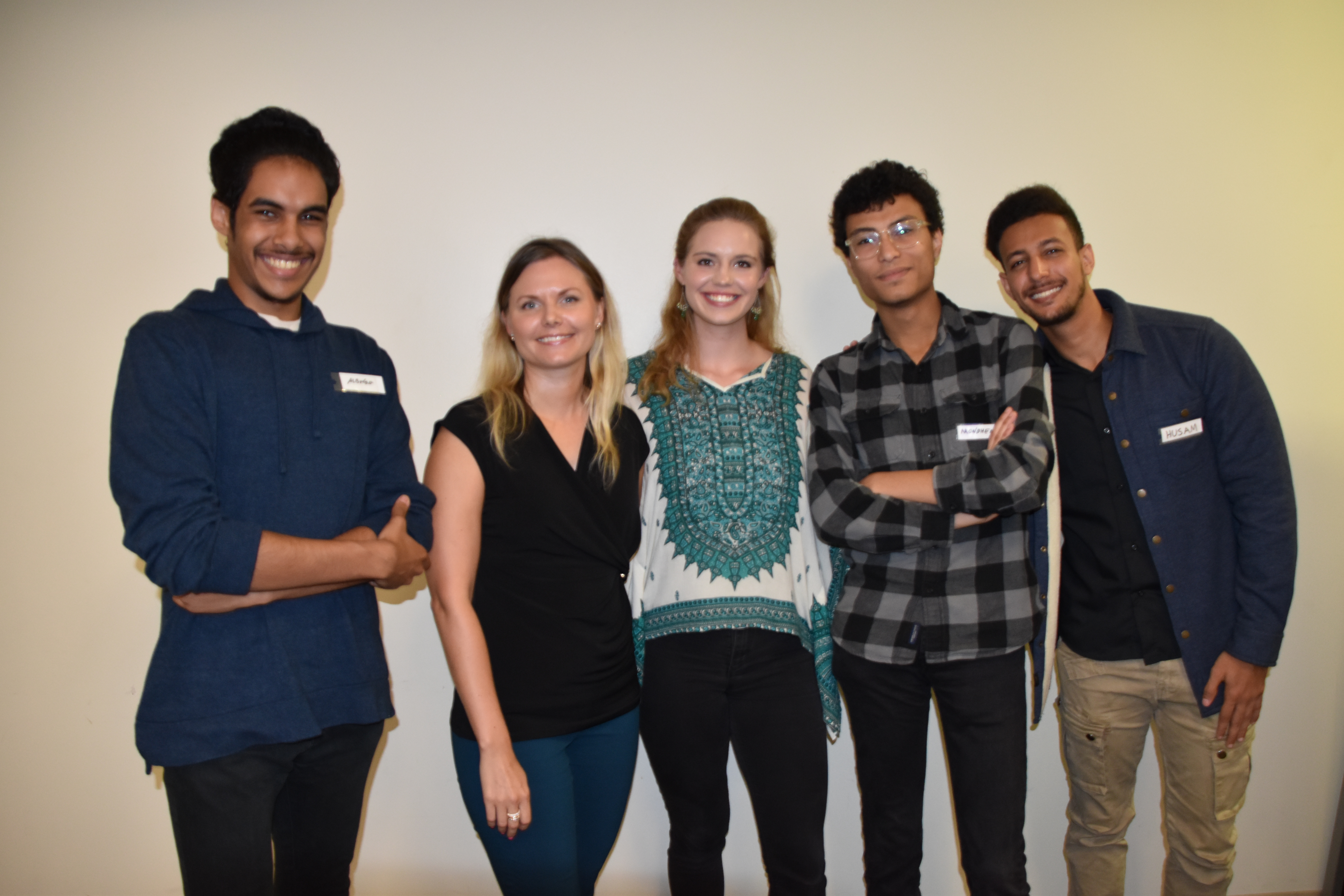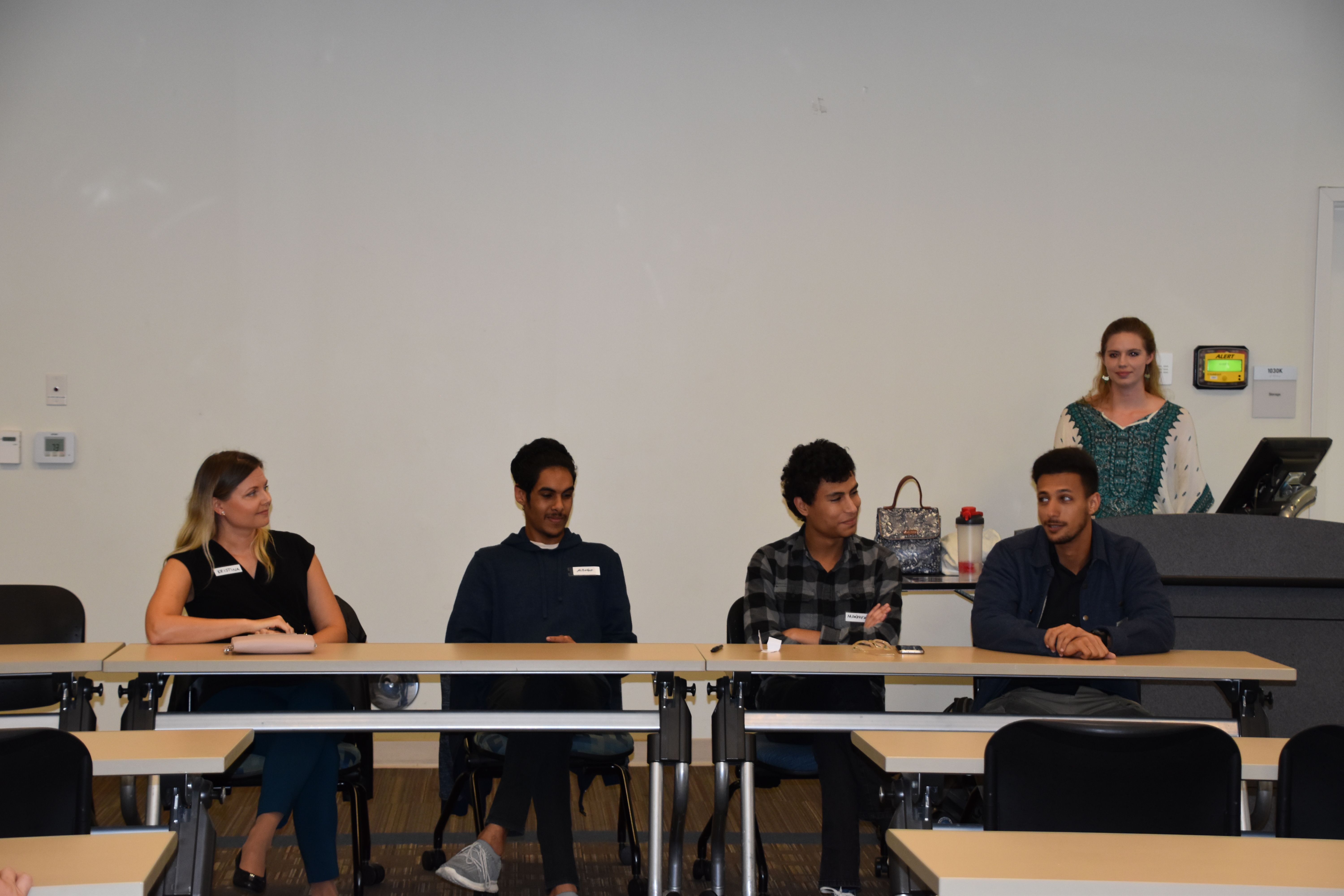
International panelists discuss perspectives on politics and voting
Contact: Nicol Tinsley
VCU Global Education Office
Phone: (804) 828-3636
nctinsley@vcu.edu
global.vcu.edu
"There is a high degree of disconnect in the U.S. between people and our political system and I believe that much of this disconnect could be decreased, or at least acknowledged, by understanding international viewpoints on our political situation,” said Doane.
Doane coordinated a panel discussion about International Students' Perspectives on Politics and Voting held on Oct. 8. The panelists provided an enlightening discussion about international politics and provided an informative backdrop for current issues going on in their individual homelands, as well as in the United States.
The panelists included VCU Humphrey Fellow Kristina Kohler from the Republic of Estonia who currently works in Public Health Policy and Management and three students from the Lebanese American University: Banking and finance major Al-Baraa Quradi; business major Husam Ali, both from Yemen; and Mondher Tounsi from Tunisia, who is studying Political Science and International Relations. The latter three panelists are juniors studying at VCU for the semester while in the 'Tomorrow's Leaders Program' at LAU.
Doane, a senior majoring in Political Science and International Studies, assembled the panel to discuss and learn more about various aspects of political systems throughout the world to help US citizens understand their own political system.
“I think it’s important for people to learn about how different countries run their political systems in order to understand the limits of accessibility or engagement in politics in their country or abroad,” she said.
Doane studied abroad in Argentina recently, and during that time, she had an eye-opening view of political discussions in a foreign country.
“While I was there, I was able to experience numerous protests and rallies,” she said. “It seemed like there was one every week, and I saw how engaged citizens were. I kept wondering to myself why is it so difficult to have these conversations in the U.S. or even at my college? How can political conversations be seen as less taboo and more personal?"
These questions Doane asked herself are what propelled her to host the event. "I think it is vital to have conversations with people, especially those with different perspectives and backgrounds so that we have the chance to hear their stories," she said.
 Panelists with the host, left to right: Al-baraa Quradi, Kristina Kohler, Madeline Doane (host), Mondher Tounsi and Husam Ali.
Panelists with the host, left to right: Al-baraa Quradi, Kristina Kohler, Madeline Doane (host), Mondher Tounsi and Husam Ali.
 International students from Tunisia and Yemen and a Humphrey Fellow from Estonia engage as panelists to discuss perspectives on politics and voting.
International students from Tunisia and Yemen and a Humphrey Fellow from Estonia engage as panelists to discuss perspectives on politics and voting.
The panel discussion
The discussion centered around questions posed to each panelist regarding the political climate, existing political parties and the overall feelings about current elected officials in their respective countries. Doane asked questions ranging from voting age requirements to existing obstacles prohibiting citizens from voting.Because of Doane's knowledge of voter disenfranchisement in the U.S. due to "gerrymandering, people with felony records not being able to vote, limited access to polling locations, and a lack of voter education leading up to elections," she felt it was important to hear about obstacles that prevent citizens in other countries from voting in order to allow U.S. citizens to see how these obstacles may be overcome.
"These barriers are present in other countries and it is beneficial to learn how other countries have navigated these situations to make politics more accessible to all members of society," she said. In response, Kohler explained that online voting exists in Estonia, which allows citizens to vote from any location enabling high voter turnout.Panelists were asked to explain what political changes have occurred because of the current political situations in their countries.
Kohler spoke of how the last election proved different because a new far-right conservative party called the “People’s Party” formed. “This was unexpected because mostly there were central political parties or social democrats at this time,” she said. “They are more like nationalists, which people are not very fond of.”
Tounsi explained that Tunisia has a parliamentary presidential system similar to France in that there are two voting rounds for the president, and that the country is in the process of becoming democratic. With a recent election that produced wins for three conservative parties, Tounsi explained that many people have issues with the outcome.
“A big chunk of the population is not really used to ideas of democracy and pluralism,” he said. “But I think it's completely fine because the regular person who is hungry and does not really know much about politics does not care about that. So it's just very ideological in that sense.”
Quradi spoke of how Lebanon is a democratic system, where the political parties do not rely on ideas, but more on 46 sects, creating many political parties. This causes an abundance of fighting among the people.
Ali spoke of how Yemen is a representative democracy and explained that within the People's Council Congress the political parties are split between the government and the Houthis, an Islamic political group.
“Currently, what's going on in Yemen is that half of the country is with the Houthis and the other half is with the actual government, which is backed up by Saudi Arabia and the UAE (United Arab Emirates). And within that government itself, you have three factions that are fighting between each other in the south, aside from the war that is going on with Houthis in the north.”
Among the questions posed to the panel, Doane asked how common is it to talk about politics amongst peers, family, friends and in classes, or is it taboo? “Is there a threat of violence when you're having these conversations about politics and political disagreements?” she asked.
“There are possibilities for things to get heated,” Quradi said of Lebanon. “It can be a bit dangerous, because some people do not have the idea of different perspectives, and they may think their political party is the right one. So it can get aggressive. Often various people like to take it to the next level. It's not just a normal argument or like talking -- it can become a competition.”
Ali stated that from his perspective in Yemen, the discussion of politics is abundant. "It's basically all we talk about. You go out into the street, you talk politics; you go inside the house, you talk politics. It's everywhere.”
Doane’s questions for the panel explored their impressions about the U.S. political system and the upcoming presidential election in order to facilitate greater understanding for U.S. citizens. “There is a high degree of disconnect in the U.S. between people and our political system and I believe that much of this disconnect could be decreased, or at least acknowledged, by understanding international viewpoints on our political situation,” she said.
Ali gave dual facets of views regarding the United States. “A lot of people are upset about the U.S. involvement in the war in Yemen,” said Ali.
“The fact that the U.S. is helping Saudi Arabia with the war in Yemen, if you look at it from the international perspective, a lot of people are against that,” he said. “But if you go into the actual country and ask the people, they tell you that they’re very glad to have Saudi Arabia fighting on our side, because the alternative is a very gruesome reality that you will not be able to comprehend unless you actually live it.”
In response to his impressions of the presidential election process, Tounsi’s views of the electoral college were eye-opening coming from someone outside of the country looking in. “The U.S. uses the electoral college and it just doesn’t make sense,” he said. “If a state has 50 million people and another state has one million people that should not be equal in any way, shape or form. I think that there should be some form of reconsideration of that law because you are talking about a democracy that does not really favor the majority. So it’s just a skewed form of democracy, I'd say.”
In addition, Tounsi finds the issues at the forefront of American politics difficult to understand.
“In Tunesia, there are so many things that are a non-issue that are problematic here,” he explained. “So abortion, for example, is free and legal for us. It has been since 1950. The issues such as free education and free health care; I come here and find that this is a problematic topic. I have to wrap my head around it sometimes.”
Kohler expressed her opinion about the debates held in the U.S. during a presidential election as intriguing.
“It's interesting to look at the U.S. presidential debates because this is something that is not happening in my country. For me, it's a show. And I could not imagine my president being on this kind of a show because our culture is more conservative than what is happening currently here,” she said.
The outcome of the panel discussion was enlightening and informative, according to Doane. "Overall, the main takeaway of this event is in order to knock down the cultural, language, and political barriers that seem to be ever-increasing in this world, we must open up the doors to hearing each other’s personal narratives," she said. "You can argue about politics all day long, but you cannot argue someone’s narrative – their story is their truth and we should encourage more people to tell their stories.”
